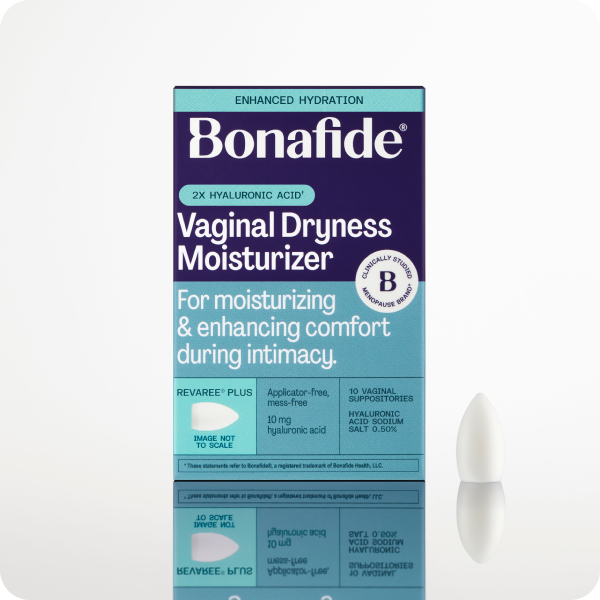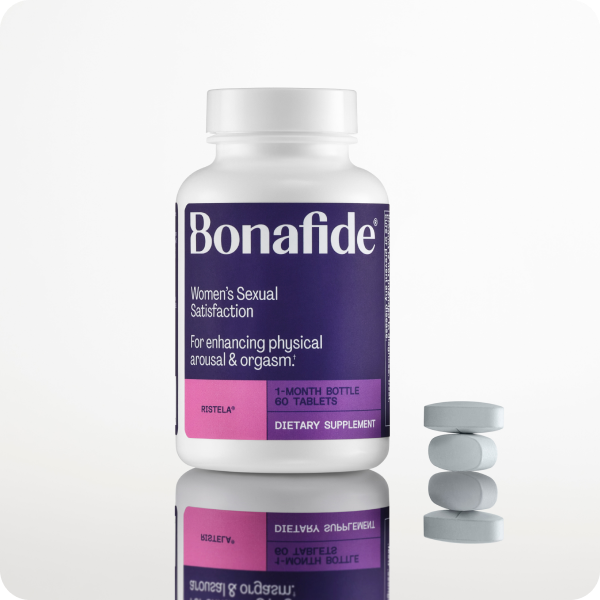It's not uncommon for women to experience less desire for sex as they enter perimenopause. There are numerous factors at play that can contribute to this, including changes in hormones, the stress experienced during of this part of life, relationship issues, sexual boredom and, in some cases, your changing body and associated shifts in self-esteem.1,2 But even as you begin perimenopause, there's a silver lining to consider. Experiencing an increased sex drive during perimenopause is possible,3 and that could have a positive impact on your overall quality of life as well.
If you’re experiencing a decline in sexual desire, however, know that you’re not alone. More than a third of women in perimenopause or menopause report struggling with sexual difficulties – which can include a decrease in desire or experiencing issues reaching orgasm.4 With these frustrating factors working against you, it’s no wonder that reigniting your interest in sex may seem like quite the undertaking during this transitional time.
Rest assured, there are strategies available that can help you to navigate changes in your sex drive during perimenopause, and some that may help you find the joy in sex again.
Check out this quick video from Chief Medical Officer, Dr. Alyssa Dweck, for a few helpful tips on getting your sex drive back.
Perimenopause and Sexuality: Strategies to Make Sex Enjoyable
For women who miss the intimacy and connection they previously felt with their partner, it may be time to consider making a few key changes to your lifestyle and routine. Try giving these tips a go if you’re looking for ways to enjoy sex during perimenopause again.
Make It a Priority in Your Schedule
A common cause of a lack of sex drive during a woman’s late 40s and 50s, is stress. 5 Your family, career, keeping up with friends, and that never-ending to-do list certainly make it hard to think about sex, much less plan for it.
But that’s exactly what you may need to do.
Consider making an appointment for sex with your partner – if you write it down in your calendar, or make yourself a mental note, it may be easier to reincorporate sexual activity into your lifestyle. If you just can’t get stress off your mind while you’re at home, consider planning an overnight trip. It doesn’t have to be far from home, or anything expensive, but a change in scenery and location may be just what you need to reignite the spark!
Think About Sex More Often
Another strategy to improve sex drive during perimenopause is to think about having sex more. Many women who struggle from low libido during perimenopause may find it’s because they just don’t think about sex as often as they used to. They have fewer sexual fantasies and erotic thoughts in general – but rekindling this part of your imagination is important, mainly because sexual arousal starts in the brain.6
By engaging in thought provoking activities, from watching erotic movies to reading a seductive novel, you may be giving your brain the push it needs to become more interested in sex again.
Make It More Comfortable
For many women navigating the stages of menopause, sex can become less comfortable; it could even be downright painful.7 It’s not uncommon to experience vaginal dryness, which can be accompanied by other uncomfortable symptoms such as burning, itching, or a tightening of the vaginal opening, all of which make sex less of an enjoyable activity.8
The use of products like Revaree® Plus could offer some relief. Designed to help reduce vaginal dryness and pain during intimacy, it’s a clinically studied, hormone-free and prescription-free option to consider for those who are looking to enjoy sex without the fear of pain or discomfort. Revaree Plus works to restore vaginal moisture and can be used by those with sensitive skin.
Work on Body Confidence
Even the most confident woman transitioning through perimenopause or menopause is likely to feel some level of body image change as they get older. While it’s natural to experience a shift in body image, perhaps due to weight gain or diminished muscle tone, this may unfortunately have a negative impact upon your desire to engage in sexual activities during perimenopause and menopause.9
To combat negative feelings and poor self-image, try to invest more time in yourself and your wellbeing – incorporating some simple lifestyle changes really can make a difference.
First, getting regular exercise may help to improve your mood, while also supporting your heart health and a healthier body weight.10 Making strategic changes to your diet, such as those that help you obtain the essential nutrients your body needs, can also help manage weight, and reduce your risk of cardiovascular diseases or osteoporosis.11
You may also be able to notice improvements in body confidence by just getting enough sleep and taking some “me time” away from the stresses of the world around you – quality sleep has been shown to help positively impact mood12, which could, in-turn, have a positive impact on overall body image.
Work to Improve Sexual Satisfaction
Some women may not know what ‘s causing them to have less interest in sex during perimenopause or menopause and it could actually be due to a wide range of factors.
Improving your satisfaction during sex, can certainly help. For some women, that may include trying new sexual positions or speaking up more directly about their sexual likes and dislikes. It could also involve spending more time on things like foreplay, to build up physical arousal and desire before engaging in sex.
There are some things you can explore to help support your body’s response to sexual stimulation as well, during this time. As mentioned earlier, reading erotica, using sexual enhancers, such as personal massagers or other sexual aides, as well as trying certain, clinically studied dietary supplements can help to improve blood flow to the genitals, which may help to improve physical arousal and orgasm in women.
Achieving an increased sex drive during perimenopause isn’t out of the question. But you may have to work at it a bit to determine what specific strategies work best for you.
Resources
- https://www.hopkinsmedicine.org/health/wellness-and-prevention/how-sex-changes-after-menopause
- https://www.nhsinform.scot/healthy-living/womens-health/later-years-around-50-years-and-over/menopause-and-post-menopause-health/menopause-and-your-mental-wellbeing/
- https://www.healthline.com/health/menopause/menopause-libido
- https://www.hopkinsmedicine.org/health/wellness-and-prevention/how-sex-changes-after-menopause
- https://my.clevelandclinic.org/health/diseases/15216-low-libido-low-sex-drive
- https://www.medicalnewstoday.com/articles/how-to-get-turned-on#home-remedies
- https://www.nia.nih.gov/health/menopause/sex-and-menopause-treatment-symptoms
- https://www.medicalnewstoday.com/articles/321615#symptoms
- https://www.menopause.org/for-women/sexual-health-menopause-online/causes-of-sexual-problems/poor-self-image-and-changes-in-your-partner
- https://www.healthline.com/health/fitness/how-female-hormones-affect-exercise-at-every-age#perimenopause-menopause
- https://www.ncbi.nlm.nih.gov/pmc/articles/PMC10780928/
- https://www.sleepfoundation.org/physical-health/beauty-sleep








